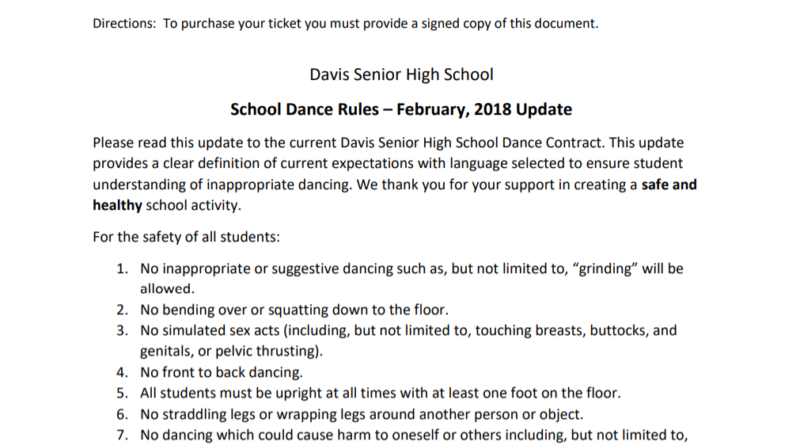Rules. Regulations. Wristbands.
By Matteo Nouve,
BlueDevilHUB.com Staff–
A single page written two years ago by Davis High administration is still a point of contention for many students. The so-called “dance contract,” updated in 2017 with additional wording, contains several stipulations intended to ensure “safe and healthy” school activity.
These stipulations include that students must not engage in suggestive dancing, must keep one foot on the ground at all times and must remain in an upright position.
Students must also wear wristbands, which are marked if they are caught breaking a rule. If they are caught again, they’ll be removed from the dance without refund.
“The dance contract was also updated because of numerous student and parent concerns in regards to the nature of dancing at our school dances,” DHS site administration said.
Recently, the dance contract was digitized as a part of the DHS enrollment process.
Senior Sandy McGlothin, who pushed for its digitization and is serving as committee head of the Homecoming dance in Student Government for her second year, believes these rules are counterproductive.
“It’s almost ridiculous in the way they enforce [the contract],” she said. “My friend got in trouble just for tapping on someone’s shoulder.”
According to McGlothin, dance attendance has dropped since the contract’s update. “It’s very obvious from the numbers,” she said. “The contract tends to scare people away from the dance.”
Anthony Vasquez, adviser of Student Government, agrees to an extent. However, he believes “other factors” such as ticket price and weather also play a significant role in attendance.
Homecoming tickets selling out this year were a result of the dance contract being online, according to McGlothin. “It makes the process easier for everyone,” she said. “There’s less disagreement.”
Some students, such as senior Cedric Hughes, have little issue with the dance contract. “I’ve attended every dance and there’s a lot of stuff in the dance contract a lot of people don’t actually follow,” he said. “Nothing would be different if it were removed.”
Chaperones are the primary enforcers, according to Vasquez. About half of them are teachers and the other half are parents.
Physics teacher and 15-time chaperone Jean-Paul Whittall claims the dance would be “utter mayhem and insanity” without some restrictions, but most chaperones only know “the gist” of the contract.
“Of course no one cares about a small hop,” Whittall said. However, McGlothin believes these vaguely enforced stipulations inhibit self-expression, overstep authority and are too conservative.
“These rules are made by a generation that don’t dance the way we do,” she said. “Just like the dress code, they’re made from older-generation eyes.”
Although DHS has always had a dance contract, the updated version is “far more specific,” according to Vasquez. It was created due to complaints from students who felt uncomfortable at dances. Student Government had some level of feedback in it, but it was composed by administration.
“I wouldn’t do away with it, but I wouldn’t make it a contract,” McGlothin said. “I think that could fix a lot of things.”
With Homecoming dance tickets sold out this year, and with the online contract looking more like a “terms and conditions” section, it looks like Student Government may have succeeded in solving the problem.



